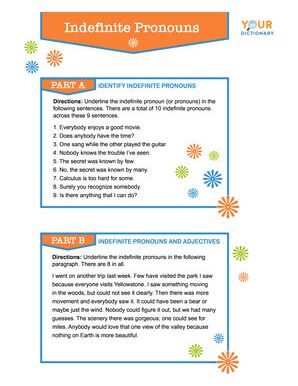

<b>Everybody</b> enjoys a good movie.
Indefinite pronouns are a helpful component of the English language. They replace nouns when too many nouns would become clunky or repetitive. As indefinite words, they don’t point to someone or something specific. Examples of singular indefinite pronouns include “someone,” “no one,” and “everyone.” Plural indefinite pronouns include words like “several,” “many,” and “others.”
The best way to practice new concepts is to see them in action in worksheets. If you’re on the hunt for some pronoun practice, we have two sheets here for you. The first indefinite pronouns worksheet is straight and to the point. Once you’re confident you or your students have things under control, you can turn things up a notch with the second worksheet.
Indefinite pronouns are a helpful component of the English language. They replace nouns when too many nouns would become clunky or repetitive. As indefinite words, they don't point to someone or something specific. Examples of singular indefinite pronouns include "someone," "no one," and "everyone." Plural indefinite pronouns include words like "several," "many," and "others."
The best way to practice new concepts is to see them in action in worksheets. If you're on the hunt for some pronoun practice, we have two sheets here for you. The first indefinite pronouns worksheet is straight and to the point. Once you're confident you or your students have things under control, you can turn things up a notch with the second worksheet.
Worksheet #1: Indefinite PronounsThis first worksheet is a straightforward approach to indefinite pronouns. It aids in recognition. If these types of pronouns can be identified, then they can also be used properly in future writing.
Part A: Identify Indefinite PronounsDirections: Underline the indefinite pronoun (or pronouns) in the following sentences. There are a total of 10 indefinite pronouns across these 9 sentences.
- Everybody enjoys a good movie.
- Does anybody have the time?
- One sang while the other played the guitar.
- Nobody knows the trouble I've seen.
- The secret was known by few.
- No, the secret was known by many.
- Calculus is too hard for some.
- Surely you recognize somebody.
- Is there anything that I can do?
Part B: Indefinite Pronouns and Adjectives
Introduction: When looking for indefinite pronouns, you have to be very careful to not get them confused with adjectives. Here's an example:
- Little is known about her past. (pronoun acting as a subject)
- See the little dog. (adjective describing the dog)
Directions: Underline the indefinite pronouns in the following paragraph. There are 8 in all.
I went on another trip last week. Few have visited the park I saw, because everyone visits Yellowstone. I saw something moving in the woods, but could not see it clearly. Then there was more movement and everybody saw it. It could have been a bear or maybe just the wind. Nobody could figure it out, but we had many guesses. The scenery there was gorgeous; one could see for miles. Anybody would love that one view of the valley because nothing on Earth is more beautiful.

Answers to Worksheet #1
A:
- Everybody enjoys a good movie.
- Does anybody have the time?
- One sang while the other played the guitar.
- Nobody knows the trouble I've seen.
- The secret was known by few.
- No, the secret was known by many.
- Calculus is too hard for some.
- Surely you recognize somebody.
- Is there anything that I can do?
B. I went on another trip last week. Few have visited the park I saw, because everyone visits Yellowstone. I saw something moving in the woods, but could not see it clearly. Then there was more movement and everybody saw it. It could have been a bear or maybe just the wind. Nobody could figure it out, but we had many guesses. The scenery there was gorgeous; one could see for miles. Anybody would love that one view of the valley because nothing on Earth is more beautiful.
Worksheet #2: Subject-Verb Agreement
In this second indefinite pronoun worksheet, students can practice subject-verb agreement. They must identify which indefinite pronouns are singular and which are plural. This is a great opportunity for them to see that some can be either singular or plural, depending on their use.
Part A: Indefinite Pronouns and Verbs
Directions: Underline the verb which agrees with the indefinite pronoun.
- Each of the family members (has, have) one vote.
- One of the boys (eat, eats) pizza every week.
- Both of the answers (is, are) correct.
- A few of the staff (was, were) gone today.
- All animals (run, runs) when they are scared.
- Someone (has, have) his own sandwich.
- Much (has, have) happened since high school.
- You know that others (has, have) tried this.
- We can begin since everybody (has, have) arrived.
- Less (is, are) usually the way to go.
Part B: Singular or Plural
Introduction: Some indefinite pronouns can be either singular or plural. These are: all, any, more, most, none, some, and such. For example:
- All is forgiven. (All is singular if you are referring to a group as a unit.)
- All have arrived. (All is plural if you are referring to individual guests.)
Whether a pronoun is singular or plural depends on the meaning of the word it is replacing.
Directions: Underline the verb which agrees with the indefinite pronoun.
- All of the newspaper (is, are) ruined.
- Some of the cookies (has, have) been eaten.
- More (is, are) coming to the play.
- None of those people (is, are) familiar to me.
Such (is, are) life.
Answers to Worksheet #2A.
- Each of the family members has one vote.
- One of the boys eats pizza every week.
- Both of the answers are correct.
- A few of the staff were gone today.
- All animals run when they are scared.
- Someone has his own sandwich.
- Much has happened since high school.
- You know that others have tried this.
- We can begin since everybody has arrived.
- Less is usually the way to go.
B.
- All of the newspaper is ruined.
- Some of the cookies have been eaten.
- More are coming to the play.
- None of those people are familiar to me.
- Such is life.
Plenty of Pronouns
Pronouns are tremendously helpful for avoiding an overabundance of nouns. Indefinite pronouns allow us to write without specificity, which is needed from time to time.
There are plenty of pronouns in the English language. Once you've mastered indefinite pronouns, check out Types of Pronouns. This article details other entities, including personal pronouns, possessive pronouns, interrogative pronouns, and more!
